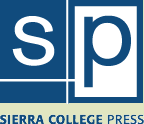Contributors to This Issue
Isabel Allende
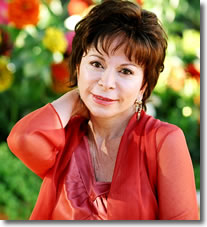 Born in Peru in 1942, Isabel Allende is the daughter of Tomás Allende, who was the Chilean Ambassador to Peru at the time. Tomás was the brother of Salvador Allende, the Socialist leader and President of Chile from 1970 to 1973.
Born in Peru in 1942, Isabel Allende is the daughter of Tomás Allende, who was the Chilean Ambassador to Peru at the time. Tomás was the brother of Salvador Allende, the Socialist leader and President of Chile from 1970 to 1973.
Isabel Allende worked for the United Nations in Europe in the early 1960s and, upon returning to Chile in 1966, she became a journalist. The Nobel Prize-winning poet (and fellow Chilean) Pablo Neruda told Isabel that she had too much imagination to be just a journalist, and encouraged her to write fiction. With this encouragement, she embarked upon a prolific writing career that continues to this day.
With the fall of her uncle’s government on Chile’s own September 11 (theirs was in 1973), Salvador Allende’s death during the attack on the Presidential Palace, and the installation of the dictatorial regime of Augusto Pinochet, Isabel Allende eventually went into exile in Venezuela. During a visit to California in 1988, she met her second husband and became a permanent resident of the state. In 2003, Isabel Allende gained United States citizenship. She was one of the eight flag bearers at the Opening Ceremony of the 2006 Winter Olympics.
Mary Austin
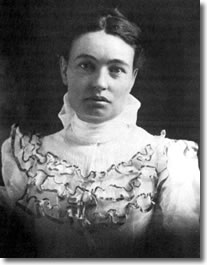 Mary Hunter Austin was an American writer of fiction and non-fiction who focused on the Sierra Nevada and Mojave Desert.
Mary Hunter Austin was an American writer of fiction and non-fiction who focused on the Sierra Nevada and Mojave Desert.
Mary Hunter was born in Carlinville, Illinois, in 1868. Her family moved to California in 1888 and established a homestead in the San Joaquin Valley. Mary married Stafford Wallace Austin in 1891. Their home in Inyo County, now a historical landmark, was designed and built by the couple. In addition to her descriptive writings on the region, Mary Austin became an expert on the Native American cultures of the southern Sierra and Mojave Desert and her studies became a respected addition to the ethnographic literature.
In 1903, Mary Austin published The Land of Little Rain, her examination of the Owens Valley and the southern Sierra Nevada region. In 1999, the San Francisco Chronicle Book Review polled its readers to choose the 20th century’s best 100 nonfiction books in English on the American West – from the Rockies to the Pacific. Austin’s Land of Little Rain topped the Chroncile’s Western 100 list.
Dan DeQuille
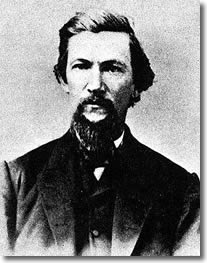 Dan DeQuille (real name William Wright) worked for the Territorial Enterprise newspaper of Virginia City, Nevada, during the great rush and development of the Comstock Lode in the 1850s and 1860s. A prolific and colorful reporter, DeQuille wrote many stories about the mines and activities of Virginia City and the nearby Sierra Nevada during late 1850s and continuing into the 1870s. He was considered a mining expert by many people. Among his colleagues at the Territorial Enterprise was a fledgling reporter named Samuel Clemens – he later became famous as Mark Twain. In 1876, Dan DeQuille decided to write a history of Virginia City and his personal reminiscences in a book titled The Big Bonanza, which included the history of the Great Comstock Lode.
Dan DeQuille (real name William Wright) worked for the Territorial Enterprise newspaper of Virginia City, Nevada, during the great rush and development of the Comstock Lode in the 1850s and 1860s. A prolific and colorful reporter, DeQuille wrote many stories about the mines and activities of Virginia City and the nearby Sierra Nevada during late 1850s and continuing into the 1870s. He was considered a mining expert by many people. Among his colleagues at the Territorial Enterprise was a fledgling reporter named Samuel Clemens – he later became famous as Mark Twain. In 1876, Dan DeQuille decided to write a history of Virginia City and his personal reminiscences in a book titled The Big Bonanza, which included the history of the Great Comstock Lode.
Dan DeQuille also wrote many magazine articles including a profile of the legendary Sierra Nevada mail carrier, Snow-shoe Thompson.
Jack Kerouac
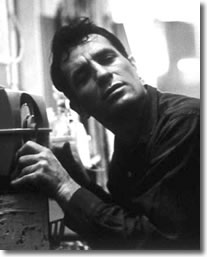 Jack Kerouac was a leader in the Beat Movement of literature that rejected the societal norms of 1950s America. Kerouac was a novelist, poet and artist whose contemporaries included Beat icons Allen Ginsburg and William S. Burroughs. For Kerouac, life’s journey centered on finding higher meaning in daily existence. Jack Kerouac wrote in a free, conversational, jazz-inspired tone that contemporary critics found difficult to comprehend, but which inspired generations of writers and artists.
Jack Kerouac was a leader in the Beat Movement of literature that rejected the societal norms of 1950s America. Kerouac was a novelist, poet and artist whose contemporaries included Beat icons Allen Ginsburg and William S. Burroughs. For Kerouac, life’s journey centered on finding higher meaning in daily existence. Jack Kerouac wrote in a free, conversational, jazz-inspired tone that contemporary critics found difficult to comprehend, but which inspired generations of writers and artists.
Kerouac is sometimes considered the intellectual father of the 1960s counterculture. His work and mindset influenced artists as diverse as Bob Dylan, The Beatles, Ken Kesey, and Hunter S. Thompson. Kerouac’s best known works include On the Road, Big Sur, and The Dharma Bums.
John Rollin Ridge
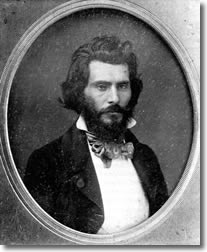 Born in New Echota, Georgia in 1827, John Rollin Ridge was the son of John Ridge, and the grandson of Major Ridge, both of whom were signatories to the Treaty of New Echota, which ceded Cherokee lands east of the Mississippi River and ultimately led to the Trail of Tears. After traveling to California during the Gold Rush, Ridge wrote the first Native American novel and the first novel written in California, The Life and Adventures of Joaquin Murieta: The Celebrated California Bandit (1854). This novel, which condemned American racism especially towards Mexicans, later inspired the Zorro stories.
Born in New Echota, Georgia in 1827, John Rollin Ridge was the son of John Ridge, and the grandson of Major Ridge, both of whom were signatories to the Treaty of New Echota, which ceded Cherokee lands east of the Mississippi River and ultimately led to the Trail of Tears. After traveling to California during the Gold Rush, Ridge wrote the first Native American novel and the first novel written in California, The Life and Adventures of Joaquin Murieta: The Celebrated California Bandit (1854). This novel, which condemned American racism especially towards Mexicans, later inspired the Zorro stories.
He died in 1867 in his adopted home town of Grass Valley, California.
Mark Twain
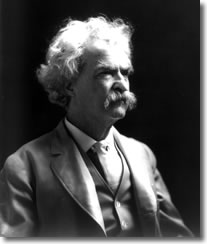 Samuel Langhorne Clemens (November 30, 1835-April 21, 1910), better known by his pen name Mark Twain, was among the most famous of American humorists, writers and lecturers. At his peak, he was probably the most well-known American anywhere. William Faulkner wrote he was "the first truly American writer, and all of us since are his heirs." His name was derived from the shout used to mark how deep the water was in steamships-"Mark Twain!" in other words, mark two fathoms.
Samuel Langhorne Clemens (November 30, 1835-April 21, 1910), better known by his pen name Mark Twain, was among the most famous of American humorists, writers and lecturers. At his peak, he was probably the most well-known American anywhere. William Faulkner wrote he was "the first truly American writer, and all of us since are his heirs." His name was derived from the shout used to mark how deep the water was in steamships-"Mark Twain!" in other words, mark two fathoms.
It is widely agreed that Twain's greatest contribution to American literature is his novel, The Adventures of Huckleberry Finn.
